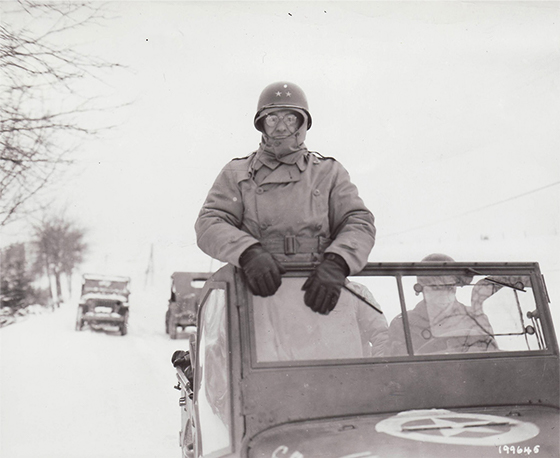Hero at The Battle of the Bulge
Troy H. Middleton
Lieutenant General, U.S. Army
General Dwight Eisenhower knew what he needed in 1944. He was looking for a leader, someone to command the U.S. Army VIII Corps and convince the German high command that the invasion of France would be at Calais. He went to Atlanta, Georgia and ordered the recuperating Colonel Troy Middleton, his former teacher, to report to England. That was bad news for the German Army.
Eisenhower also knew that Middleton would not sit on the beach and wait. In command of the 45th Infantry Division during the invasion of Italy in 1943, Middleton decided to get off the beach and intensify his attack. This action spearheaded battlefield victories that inspired the troops and rallied the invasion forces toward the eventual fall of Italy to the Allies.
- The Battle of the Bulge
History would repeat itself when, in the frozen Ardennes forest of Belgium during the Battle of the Bulge in December 1944, Middleton once more refused to stop and give up. Instead, he led a battle-weary army in a vicious defense of Bastogne. Outnumbered and surrounded by German troops, Middleton’s VIII Corps, now with the 101st Airborne and Combat Command B of the 10th Armored Division, held Bastogne and won the Battle of the Bulge. The successful defense of Bastogne and his link-up with General Patton’s Third Army marked the beginning of the end of the German offensive.
Following this battle, in January 1945, the VIII Corps crossed the Rhine River and relentlessly pushed across Germany, liberated the Ohrdruf concentration camp near Erfurt, finally reaching Czechoslovakia and meeting the Russian Army coming from the east at Chemnitz. Middleton logged 480 days in combat during World War II, more than any other American general officer.
- Humble Beginnings
This war hero was born on a simple farm near Georgetown, Mississippi, in 1889. He graduated from Mississippi A&M College (now Mississippi State University) in 1909. While a cadet in college, Middleton became interested in the military as a career and, in 1910, enlisted in the Army as a private. By 1915, he had been promoted to Second Lieutenant and was serving in General John J. Pershing’s Seventh Infantry Division.
- World War I
During World War I, Middleton served with distinction in the 47th Infantry Regiment in France leading the way at the Second Battle of the Marne and the Saint Mihiel and Meuse Argonne offensives. He became the youngest Colonel in the American Expeditionary Force and received the Army Distinguished Service Medal.
- LSU Commandant of Cadets
In 1930, Middleton became the Commandant of Cadets at LSU. His first tasks were to stem opposition to compulsory ROTC and to increase the size of the Cadet Band. In 1936, having overseen the increase in students completing the ROTC program from about 500 to more than 1700 Cadets, Middleton returned to active service and was stationed in the Philippines. Later that year, LSU President James Monroe Smith offered Middleton the job of Dean of Administration and Middleton accepted.
- World War II
Aware of the rumors of war in 1941, and after the attack on Pearl Harbor, Middleton notified LSU of his intention to return to active duty and, in 1942, received his orders. Middleton eventually was given command of the 45th Division (Thunderbirds) and promoted to Major General.
Middleton led the 45th Infantry Division during the Sicily and Salerno battles in Italy and in March 1944 moved up to command the VIII Corps in England. His leadership in Operation Cobra during the Battle of Normandy led to the capture of the important port city of Brest, France and for his success, he was awarded a second Distinguished Service Medal by General George S. Patton. He was recognized by General Dwight Eisenhower, the Supreme Allied Commander and General Patton as being a corps commander of extraordinary abilities. Middleton retired as a Lieutenant General in 1945.
- LSU President
In February 1951, Middleton was elected to serve as LSU’s president. He held that position until his retirement in 1962. Middleton died in Baton Rouge on October 9, 1976 and is buried in the Baton Rouge National Cemetery.
“First of all, he had moral courage, and he had common sense, and he took full advantage of all the experiences he'd had. You know, I like that saying attributed to Napoleon, that the genius in war is the man who can do the sensible thing or an average thing, when everybody else around him is crazy. Well now, that was Troy Middleton. Troy typified what you think of as the best in the Regular Army. He was intelligent, dedicated and loyal. He always acted according to the old aphorism: Always take your job seriously and never yourself.”
Former United States President Dwight Eisenhower
